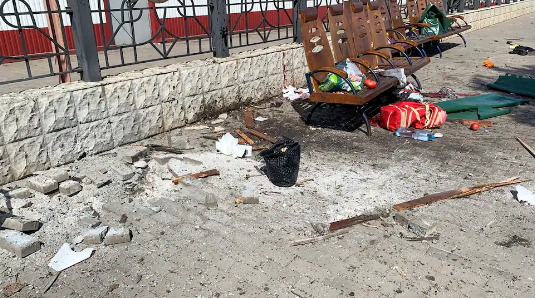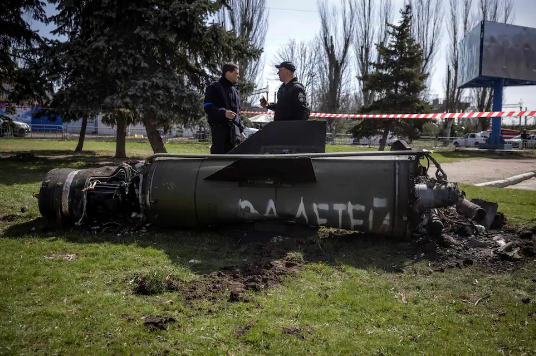This is another Russian war crime for which everyone involved will be held accountable,” Zelensky said in a video message, referring to Friday’s missile strike that killed 52 people, including five children, according to a final report from the local authorities.
“World powers have already condemned Russia’s attack on Kramatorsk. We expect a firm global response to this war crime,” he continued. US President Joe Biden has denounced a “horrible atrocity” committed by Moscow and French diplomacy as a “crime against humanity”.Moscow denied being responsible for the strike, saying it did not have the type of missile that would have been used, before denouncing a Ukrainian “provocation”.
A senior US Department of Defense official dismissed the arguments of the Russian authorities.
“I note that initially, they reported a successful strike and that they retracted only after reports of civilian casualties,” said the official.
The Russian Ministry of Defense had indeed announced earlier Friday that the Russian army had destroyed with high-precision missiles “weapons and other military equipment in the stations of Pokrovsk, Sloviansk, and Barvinkove”, localities all located not far from Kramatorsk, the “capital” of the part of Donbas still under Ukrainian control.

The missile fell around 10:30 a.m. (07:30 GMT), at a time when candidates for evacuation have been gathering for days by the hundreds in the city’s train station to flee Donbas, now a priority objective for the Russian army.
AFP journalists saw at least 30 bodies in body bags or under tarpaulins. The sidewalks were stained with blood, and abandoned suitcases, stuffed animals, and food littered the platforms.
On the forecourt, the remains of a missile were still visible: one could read in Russian “For our children”. A recurring expression of pro-Russian separatists in reference to their children killed since the first Donbas war, which began in 2014.
In the station, a woman, traumatized, was looking for her passport in her abandoned belongings. “I heard like a double explosion, I rushed against the wall to protect myself. I then saw people bleeding into the station, bodies all over the ground, I don’t know if they were injured or dead. The soldiers rushed to tell us to evacuate the station, I left everything here”.
Arrived Friday in Ukraine for a support visit, accompanied by the head of EU diplomacy Josep Borrell, the president of the European Commission Ursula von der Leyen, for her part denounced A “despicable attack”.The two went to Boutcha, near Kyiv, a city symbol of the atrocities of which Russia is accused.
Dozens of corpses wearing civilian clothes, some with their hands tied behind their backs, were discovered in this locality, 30 km from the Ukrainian capital, in early April after the departure of Russian forces.
“I am deeply convinced that Ukraine will win this war, that democracy will win this war,” Ms. von der Leyen then declared in Kyiv, during a joint press conference with Mr. Zelensky. The Austrian Chancellor, Karl Nehammer, must also go to Boutcha on Saturday, as well as to Kyiv.
Evacuations
After withdrawing its troops from the Kyiv region and northern Ukraine, Russia has made the total conquest of Donbass, part of which has been controlled since 2014 by pro-Russian separatists, its priority.
President Vladimir Putin wants to achieve that goal ahead of the May 9 military parade marking the end of World War II, Russia’s biggest celebration, observers note.
And in anticipation of a massive offensive, local authorities in eastern Ukraine are scrambling to evacuate civilians.
In Lozova, about 100 km west of Kramatorsk, about 15,000 people have so far left the town and 50,000 are still there, the head of the military administration said Friday evening on Telegram. regional, Oleg Sinegubov.
Departures are organized by trains and cars, he said, while mentioning fighting taking place “nearby”.
Threatened in turn by strikes, the large port of Odesa, in the south of the Black Sea, will experience a curfew from Saturday evening to Monday morning, local authorities have announced.
New penalties
Following revelations of abuses in Ukraine, Russia was suspended on Thursday by a vote of the UN Human Rights Council and has been the target of new Western economic sanctions, which do not, however, prevent the rouble, the Russian currency, to have regained strength over the past month.
The Russian Central Bank even announced on Friday that it was reauthorizing from April 18 the sale of foreign currencies, which had been suspended at the beginning of March. London has decided to sanction the two daughters of President Putin and that of the head of diplomacy Sergei Lavrov, saying it wants to attack the “lavish lifestyle of the inner circle of the Kremlin”. The EU has also blacklisted the Kremlin leader’s two daughters.

It had already adopted a new set of punitive measures on Thursday evening, including an upcoming halt to imports of Russian coal. This is the very first time that the Europeans have hit the Russian energy sector, on which they are very dependent. Brussels is also planning new sanctions against Russian banks as well as the closure of European ports to Russian ships.
Kyiv is calling for the “immediate” supply of weapons to deal with a new Russian offensive in the East.
The United Kingdom has announced the dispatch of additional anti-tank and anti-aircraft missiles. And Slovakia “donated” Soviet-designed S-300 air defense systems to Kyiv.
In Russia, the Ministry of Justice decided on Friday to close the premises of several reputable human rights NGOs, including Amnesty International and Human Rights Watch. The indirect repercussions of the conflict are also still being felt around the world.
The Food and Agriculture Organization of the United Nations pointed out on Friday that world food prices reached their “highest levels on record” in March, as the war in Ukraine upset grain and oil markets. plants.

